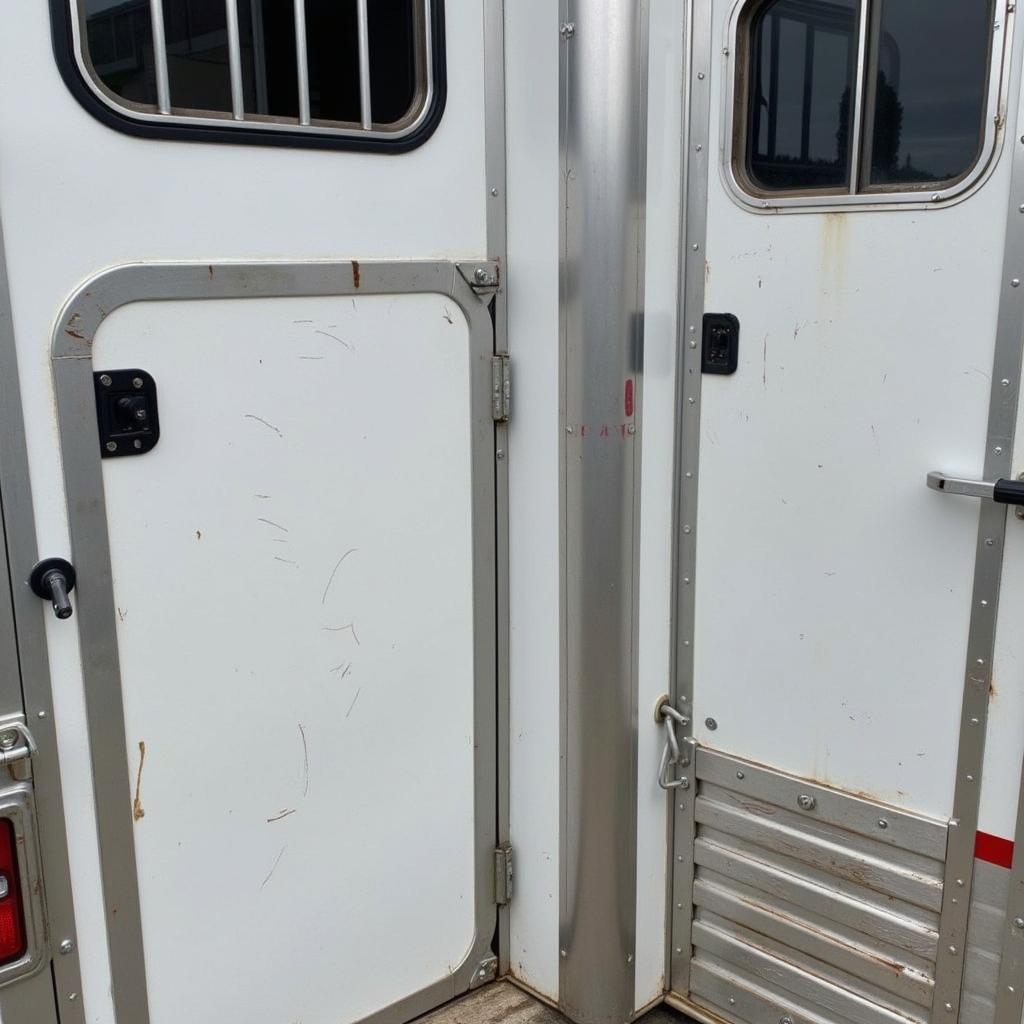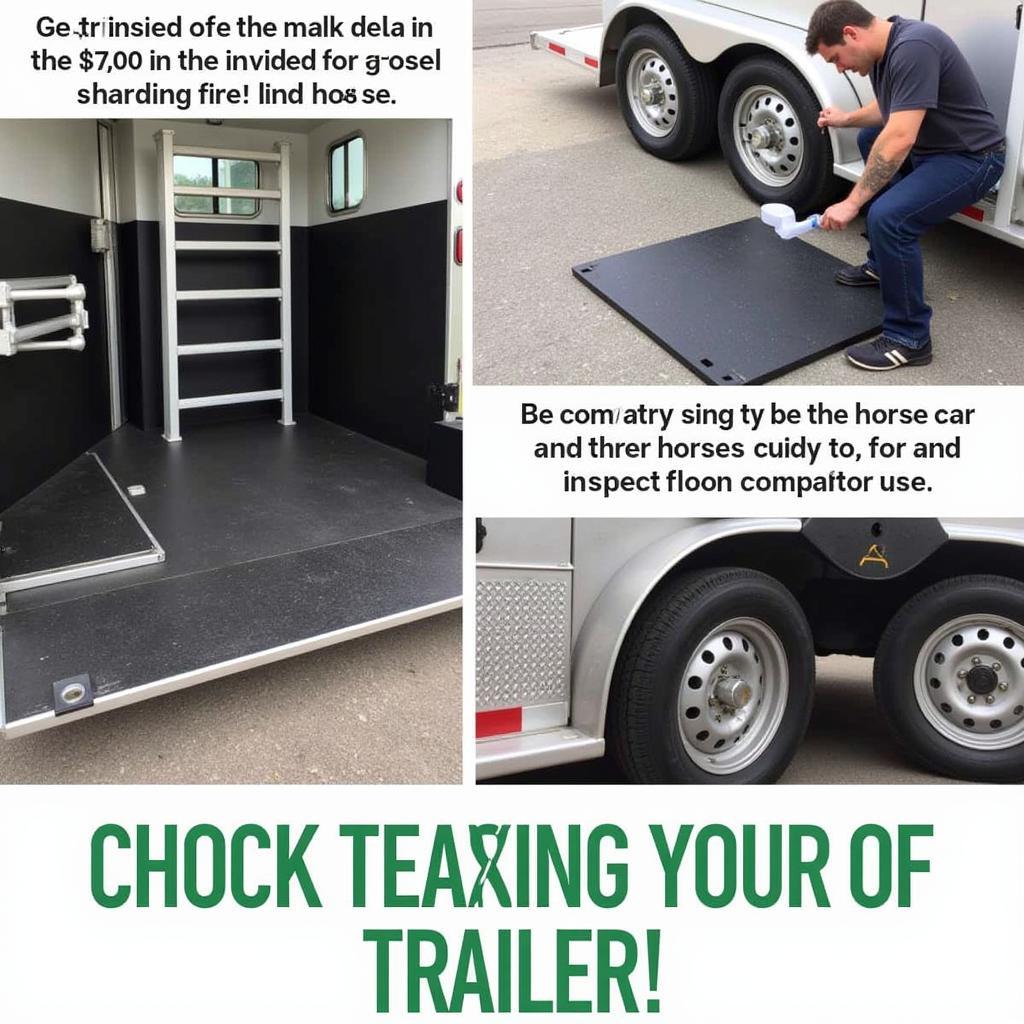Navigating the world of buying and selling horse trailers can feel as daunting as saddling up a green horse for the first time. You want to be sure you’re getting a fair deal, whether you’re a seasoned rancher or a first-time horse owner. That’s where the “Kelly Blue Book For Horse Trailers” comes in – though not in the way you might think! While a dedicated Kelly Blue Book for horse trailers doesn’t technically exist, there are resources and strategies you can use to determine a fair market value. This guide will equip you with the knowledge you need to confidently buy or sell your next horse trailer.
Deciphering the Value of Your Horse Trailer
 Assessing Horse Trailer Condition
Assessing Horse Trailer Condition
Unlike cars, horse trailers don’t have a standardized valuation system like the Kelley Blue Book. However, several factors significantly influence their worth:
- Brand and Model: Just like cars, certain horse trailer brands and models are known for their durability, craftsmanship, and features, impacting their value.
- Age and Condition: A well-maintained older trailer might fetch a better price than a newer one with signs of neglect.
- Size and Capacity: The size and weight capacity of a trailer, often dictated by the number of horses it can transport, directly affect its market value.
- Features and Upgrades: Additional features such as living quarters, padded dividers, escape doors, and custom paint jobs can increase a trailer’s value.
- Location: Believe it or not, geography plays a part! Horse trailers in areas with a high concentration of equestrians might command higher prices.
Tapping into Resources for Horse Trailer Valuation
While a dedicated Kelly Blue Book for horse trailers remains elusive, fret not! Several avenues can help you gauge a fair market value:
1. Online Marketplaces: Your Virtual Sale Barn
- Websites like EquineNow, HorseClicks, and even Facebook groups dedicated to horse trailers offer a treasure trove of listings. Analyze comparable trailers – those similar in age, brand, condition, and features to yours – to get a sense of the going rates.
2. Professional Appraisals: Expert Eyes on the Prize
- Consider hiring a certified appraiser specializing in livestock trailers or recreational vehicles. These professionals use their expertise and market knowledge to provide a comprehensive and unbiased assessment of your trailer’s worth.
3. NADA Guides: Your Guide to Recreational Vehicles
- The National Automobile Dealers Association (NADA), renowned for its car valuations, also provides guides for recreational vehicles, including horse trailers. Keep in mind; these guides offer a general starting point, and adjustments might be necessary based on your trailer’s specific condition and features.
Selling Your Horse Trailer? Tips for Success
Selling your horse trailer requires more than slapping on a price tag. Here are some proven strategies:
- Presentation is Key: A clean, well-maintained trailer is more appealing to buyers. Thoroughly clean the interior and exterior, polish those surfaces, and ensure everything is in working order.
- Highlight those Features: Emphasize any unique features or upgrades when creating your listing.
- High-Quality Photos: Showcase your trailer with clear, well-lit photos that capture its best angles and highlight its condition.
- Price it Right: Research comparable listings and consider professional appraisals to set a competitive and realistic asking price.
Buying a Used Horse Trailer? Buyer Beware!
 Thorough Inspection of a Used Horse Trailer
Thorough Inspection of a Used Horse Trailer
Purchasing a used horse trailer can save you money, but it’s crucial to be an informed buyer:
- Inspect Before You Buy: Never purchase a trailer without a thorough inspection. Check for rust, wear and tear on tires and floors, functionality of lights and brakes, and overall structural integrity.
- Ask for Maintenance Records: Requesting maintenance records from the seller can provide valuable insights into the trailer’s history and upkeep.
- Don’t Be Afraid to Negotiate: While it’s important to respect the seller’s asking price, don’t be afraid to negotiate, especially if you discover any necessary repairs during your inspection.
Finding the Right Fit for You and Your Equine Partner
Navigating the world of horse trailer values doesn’t have to be a wild ride. By leveraging available resources, conducting thorough research, and prioritizing a careful inspection, you can make informed decisions and ensure a safe and comfortable journey for both you and your equine partner.
Frequently Asked Questions about Horse Trailer Values
1. What is the average lifespan of a horse trailer?
A well-maintained horse trailer can last 10-15 years, even longer with proper care and regular maintenance.
2. Should I get my horse trailer professionally inspected before selling it?
While not mandatory, a pre-sale inspection by a qualified professional can provide peace of mind to both you and potential buyers. It also provides valuable documentation of the trailer’s condition.
3. Does my car insurance cover my horse trailer?
Auto insurance policies vary, so it’s crucial to contact your provider to confirm coverage for your horse trailer. You might need additional coverage or a separate policy altogether.
4. How often should I service my horse trailer?
It’s generally recommended to service your horse trailer at least once a year, or more frequently if you use it often or for long distances.
5. What are some red flags to watch out for when buying a used horse trailer?
Be wary of trailers with excessive rust, soft or rotting floorboards, faulty wiring, inoperable brakes, and inconsistent maintenance records.
Need assistance with your horse trailer needs? Contact us at Phone Number: 0772127271, Email: [email protected] or visit us at QGM2+WX2, Vị Trung, Vị Thuỷ, Hậu Giang, Việt Nam. Our dedicated team is available 24/7 to assist you.